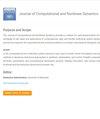利用正交历史函数确定延迟微分方程线性稳定性的数据驱动法
IF 1.9
4区 工程技术
Q3 ENGINEERING, MECHANICAL
引用次数: 0
摘要
延迟微分方程 (DDE) 出现在许多应用中,确定其稳定性是一项具有挑战性的任务,受到了广泛关注。文献中有许多确定给定 DDE 稳定性的方法。然而,在实际应用中,如果能够仅根据延迟系统对给定输入的响应来确定其稳定性,而无需考虑基本的支配 DDE,可能会有所裨益。在这项工作中,我们提出了这样一种数据驱动方法,只假定基础 DDE 有以下三点:(i) 它是线性的;(ii) 它的系数是常数或具有已知基本周期的时间周期;(iii) 最大延迟是已知的。我们的方法是将正交多项式基的前几个函数作为输入,测量/计算相应的响应,生成状态转换矩阵 M,其最大特征值决定稳定性。我们通过研究四个具有不同特征的候选 DDE,证明了我们方法的正确性、有效性和收敛性。我们证明了我们的方法对噪声的鲁棒性,从而确定了它在实际应用中的适用性,因为在实际应用中测量误差是不可避免的。本文章由计算机程序翻译,如有差异,请以英文原文为准。
Data Driven Approach to Determine Linear Stability of Delay Differential Equations Using Orthonormal History Functions
Delay differential equations (DDEs) appear in many applications, and determining their stability is a challenging task that has received considerable attention. Numerous methods for stability determination of a given DDE exist in the literature. However, in practical scenarios it may be beneficial to be able to determine the stability of a delayed system based solely on its response to given inputs, without the need to consider the underlying governing DDE. In this work we propose such a data-driven method, assuming only three things about the underlying DDE: (i) it is linear, (ii) its coefficients are either constant or time-periodic with a known fundamental period, and (iii) the largest delay is known. Our approach involves giving the first few functions of an orthonormal polynomial basis as input, and measuring/computing the corresponding responses to generate a state transition matrix M, whose largest eigenvalue determines the stability. We demonstrate the correctness, efficacy and convergence of our method by studying four candidate DDEs with differing features. We show that our approach is robust to noise, thereby establishing its suitability for practical applications, wherein measurement errors are unavoidable.
求助全文
通过发布文献求助,成功后即可免费获取论文全文。
去求助
来源期刊
CiteScore
4.00
自引率
10.00%
发文量
72
审稿时长
6-12 weeks
期刊介绍:
The purpose of the Journal of Computational and Nonlinear Dynamics is to provide a medium for rapid dissemination of original research results in theoretical as well as applied computational and nonlinear dynamics. The journal serves as a forum for the exchange of new ideas and applications in computational, rigid and flexible multi-body system dynamics and all aspects (analytical, numerical, and experimental) of dynamics associated with nonlinear systems. The broad scope of the journal encompasses all computational and nonlinear problems occurring in aeronautical, biological, electrical, mechanical, physical, and structural systems.

 求助内容:
求助内容: 应助结果提醒方式:
应助结果提醒方式:


